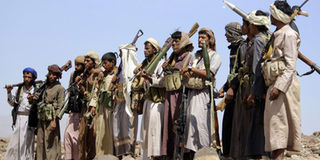Over a dozen killed as clashes hit Yemen

Armed Yemeni fighters, loyal to Yemen's Saudi-backed President Abedrabbo Mansour Hadi, stand in position during clashes with Shiite Huthi rebels in the area of Jaadan, in Marib province east of the capital Sanaa on May 15, 2015. PHOTO | STR |
What you need to know:
- The fighting in Taez overnight forced many to flee to the countryside.
SANAA, Saturday
Fierce clashes between rebels and pro-government forces killed dozens across south Yemen on Saturday, threatening to derail a humanitarian ceasefire drawn up to bring vital aid to the war-wracked country.
The five-day truce initiated by a Saudi-led coalition that has bombarded the Iran-backed rebels for more than six weeks expires late Sunday, and Riyadh has already warned it was “ready to act” against any ceasefire violations.
In the latest violence, at least 12 civilians were killed and 51 wounded when the Shiite Huthi rebels shelled several neighbourhoods in Yemen’s third city of Taez, military and local sources said.
The clashes came after overnight fighting killed 26 Huthi rebels and militiamen loyal to former president Ali Abdullah Saleh as well as 14 pro-government forces, military sources said.
The United Nations has expressed deep concern about the civilian death toll from the Saudi-led bombing as well as the humanitarian impact of an air and sea blockade imposed by the coalition.
It says more than 1,500 people have died in the conflict since late March.
Some aid has begun to trickle into Yemen since the pause in fighting, but residents of areas where clashes persist complain they remain without the most basic supplies.
The fighting in Taez overnight forced many to flee to the countryside.
“Humanitarian aid hasn’t reached Taez, where we haven’t received fuel, food or medical equipment,” said a government official in the city.
The United Nations has called for the Saudi-led coalition to simplify import inspections after warning that supplies were still blocked. UN coordinator Johannes van der Klaauw warned that the inspections, introduced under an arms embargo slapped on the Huthi rebels last month, were hampering aid deliveries.
“The arms embargo and its inspection regime results in commercial goods, be it by air or by ship, no longer reaching the country,” he said.




